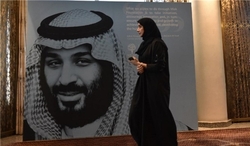 A United Nations special rapporteur called on the member states of the UN Human Rights Council to pressure Saudi Arabia to free women activists, four months before the Arab kingdom is to hold the 2020 G20 Riyadh summit.
A United Nations special rapporteur called on the member states of the UN Human Rights Council to pressure Saudi Arabia to free women activists, four months before the Arab kingdom is to hold the 2020 G20 Riyadh summit. Rasa - Agnes Callamard, the UN special rapporteur on extrajudicial, summary or arbitrary executions, made the call during a speech to the council in Geneva on Thursday, according to presstv.
The Saudi regime should release “prisoners of conscience, women, human rights defenders that are currently in prison for demanding the right to drive,” she said.
Saudi authorities put at least a dozen prominent women’s activists behind bars in 2018 as the regime lifted a ban on women driving cars, a step that most of the detainees had long campaigned for.
These activists were arrested as part of a broader plan of crackdown on dissent that extended to even clerics and intellectuals.
According to Reuters, several of the arrested women have already said that they had gone through torture and been the victim of sexual assault in detention.
Saudi officials, however, reject the allegations, claiming that the detainees were suspected of having damaged Saudi interests and allegedly offered support to what they described as hostile elements abroad.
A number of these women are now on trial, but little is known about the charges against them. Some of these female activists have been detained on charges of making contacts with foreign journalists, diplomats and human rights groups.
Particularly after the gruesome killing of journalist Jamal Khashoggi in the Saudi consulate in Istanbul in October 2018, the prosecution of these women has drawn global criticism.
Elsewhere in his remarks on Thursday, Callamard who currently leads a UN investigation into Khashoggi’s killing, said that “far more needs to be done” internationally regarding accountability for his death.
On Wednesday, Ghada Oueiss, a principal anchor and presenter for Al- Jazeera Arabic, revealed in an article published in the Washington Post that she had fallen victim to “cyberbullying” and a “coordinated” smear campaign by a large number of Saudi Twitter accounts, which used content apparently stolen from her cell phone by hackers.
The Lebanese journalist also said that all the accounts abusing her displayed the Saudi flag, a picture of Saudi Crown Prince Mohammad bin Salman or the crown prince of Abu Dhabi.
She also said the Saudi regime has been terrified by the movement for women’s rights in the Arab kingdom, which “has insisted on doling out reforms on its own terms while detaining the female activists behind the movement”.
Saudi authorities have arrested dozens of activists, bloggers, intellectuals and others perceived as political opponents ever since bin Salman became Saudi Arabia’s de facto leader in 2017, showing almost zero tolerance for dissent even in the face of international condemnations of the clampdown.
Over the past years, Riyadh has also redefined its anti-terrorism laws to target activism.